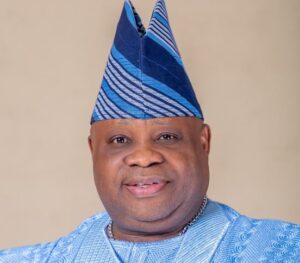
Senate rejects ‘rubber-stamp’ label, says cooperation is not compromise
…Says tax reform bill not anti-people
By Idowu Adebomi, Ado Ekiti
The Nigerian Senate has pushed back against claims that it functions as a “rubber-stamp” institution, maintaining that it does not need to adopt an antagonistic approach to prove its independence from the executive arm of government.
Chairman of the Senate Committee on Media and Publicity, Senator Yemi Adaramodu, made the remarks during a media chat with journalists over the weekend in Ilawe Ekiti.
According to Adaramodu, the Senate’s core responsibility is to serve as a constructive partner in governance—working hand in hand with other branches to shape effective and impactful legislation. He stressed that rejecting bills for the sake of opposing the executive is not a meaningful demonstration of autonomy.
“The National Assembly is a serious institution devoted to legislative business. Our duty is to make laws and approve appropriations, while the executive implements and the judiciary interprets. There’s no need for needless confrontation just to prove a point,” he explained.
The Senate spokesperson dismissed accusations that the upper chamber lacks backbone, describing such claims as cheap blackmail meant to distract lawmakers from their legislative mandate.
“If the executive submits a bill on minimum wage, are we supposed to ignore it? If it’s an appropriation bill or one concerning road construction, should we simply discard it because we want to appear oppositional?” he asked rhetorically.
He criticised the tendency of some Nigerians to jump to conclusions whenever a bill is introduced, noting that such reactions often stem from personal interests rather than national concerns.
“Too many people want laws tailored to their preferences. Instead of calmly reviewing a bill, they rush to label the Senate as subservient to the executive. That’s an unfair and unfounded narrative,” he added.
Adaramodu also addressed recent criticism surrounding the Senate’s involvement in the declaration of a state of emergency in Rivers State. He urged citizens to seek clarity on the legal framework guiding such decisions before assigning blame.
“There are laid-down rules in our standing orders and the constitution. If there’s a threat to peace in any state, the Senate has the authority to respond. After deliberation, the matter goes to the President, who then takes the final decision,” he said.
He accused Governor Sim Fubara and certain members of the Rivers State House of Assembly of creating instability and lawlessness in the state. According to him, the Senate had to act in the absence of functional governance, pointing out that when the matter was brought to a vote, 74 out of 109 senators formed a quorum and unanimously voted in support.
Senator Adaramodu also challenged public misconceptions about the Senate’s role in the controversial tax reform bills.
“Many people wrongly believed the Senate was pushing anti-people policies,” he said. “The tax reform bills were fiercely opposed at first, but how many of those critics are still complaining today?”
He described the reforms as transformative, saying they have the potential to reshape the economy and correct long standing inequalities in the tax system.
“These bills are designed to be game-changers. When fully implemented, they will address the unfairness that has plagued our revenue framework for years,” he said.
Adaramodu also noted that the new provisions would exempt essential goods and export products from Value Added Tax (VAT), ensuring the burden does not fall on ordinary Nigerians.




